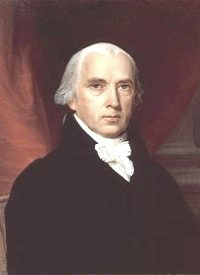
Sure, there’s the beach and amusement parks, but if you’re up for a bit of history, a bit of a pilgrimage, and a horizon full of the most beautiful vistas you’ll ever see, then perhaps you should head over to a little town in the Blue Ridge Mountains of Virginia called Orange and visit the home of the “Father of the Constitution,” James Madison.
March 16th is the 260th anniversary of the birth of our country’s fourth president, James Madison, Jr. Well, that’s the day we celebrate Madison’s birthday, anyway. Mr. Madison himself might have disagreed. As renowned Madison biographer Ralph Ketcham explains:
Because of his birth just before Great Britain’s calendar reform in 1752, Madison has two “birthdates,” a Julian, or Old Style, one and a Gregorian, or New Style, one. A calendar on the wall the night of his birth would have read March 5, 1750, reflecting the eleven-day lag accumulated by the inaccurate Julian calendar, and the designation of March 25 rather than January 1 as the first day of the new year. Adoption of the Gregorian calendar added eleven days to Old Style dates and changed the first of the year date, thus making Madison’s birthdate March 16, 1751, New Style, though like many of his contemporaries he sometimes used the Old Style date and/or year in speaking of his birth.
At Montpelier, the home Madison shared with his wife, Dolley, big plans are being made to celebrate the little man’s (he was our shortest president) big day. From the official website:
You are cordially invited to celebrate the anniversary of James Madison’s 260th birthday at Montpelier, his lifelong home. Attend the 10:30 a.m. unveiling of an historical marker in honor of Dolley Madison, the woman who inspired the title of “first lady.” Then attend a poignant wreath-laying ceremony at President Madison’s grave at 1:30 p.m. M. Kirkland Cox, Majority Leader of the House of Delegates and chairman of the Virginia Commission on the Bicentennial of the War of 1812, will deliver remarks during the ceremony. Also visit “James” and “Dolley” Madison throughout the day.
So, what makes James Madison so important? Why should you cancel your oceanside condo reservations in Fort Lauderdale and head for the Old Dominion? Perhaps this brief article will persuade you.
Physically, James Madison was unimpressive. At just under five feet six inches tall with a weak voice and of somewhat delicate constitution (he suffered from hypochondria), Madison did not strike an imposing figure, unlike Washington and Jefferson both of whom were physically superior to him. Madison’s life, however, is a lesson in overcoming one’s physical impediments and not allowing such to retard the intellectual growth and influence one may achieve through self-discipline and honest, consistent study and work. Although painfully shy socially, Madison never shied away from taking upon himself the burdens of earnest thought and planning that others found unbearable.
Planning, study, and critical thought were three of Madison’s greatest contributions to the cause of American liberty. It is perhaps accurate to declare that Madison earned his place of reverence among the Founding Fathers because he arrived in Philadelphia in May 1787 with a plan — the Virginia Plan. The Virginia Plan was the result of many months reading and studying the records of republics of the past and analyzing them with a well-focused and critical eye. Madison’s focus was on the American people and he knew that any government formed for this country would need to implement the best ideas of the sage political thinkers and philosophers of the past while adroitly avoiding the pitfalls that pocked the path so many other republics had trod and followed to their eventual demise. The American experiment was novel and of necessity its government would be also.
Madison’s early education came at the feet of tutors who, fortunately for Madison, were energetic, zealous, and eager to quench young Madison’s constant thirst for knowledge. One of his early teachers was Donald Robertson, a brilliant but stern professor who followed the old Scottish tradition of “dispensing learning with a burr.” At the Robertson school Madison, as all young men of his day, was expected to learn Latin and Greek with what by today’s standards would be extraordinary proficiency. Records indicate, however, that during his first year under the tutelage of Robertson, Madison’s Latin was too weak to permit enrollment in many of the classes he most desired so he was compelled to begin his studies in English. In a manner typical of his perpetual quest for self-improvement, Madison redoubled his efforts to learn Latin and in fact learned the language so well, years later while studying international law as Secretary of State, he was able to make corrections to the English translations of Latin works by Grotius, Pufendorf, and Vattel.
Next, to prepare his young son for college, Madison’s father employed the services of a young and able Scot — Thomas Martin. Martin was a recent graduate of the College of New Jersey at Princeton and he brightly reflected much of the intellectual vigor and zeal of the New Light Presbyterians who guided that institution. It is likely that Mr. Martin’s example and exciting stories of life at Princeton encouraged James Madison to depart from the Virginia tradition of sending young men to William and Mary for their higher education and to set his sights on Princeton. Of course, the fact that the president of Princeton, John Witherspoon, was a schoolman pressed from the same stern, Scottish mold as Madison’s mentor Donald Robertson probably made the decision to attend Princeton an easier one and likely filled Madison with eager anticipation.
As was the case with his earlier teachers, John Witherspoon played a substantial role in the formation of Madison’s character and political thought. Witherspoon was a teacher renowned for the keenness of his wit and the ardor of his intellectual enthusiasm. Witherspoon encouraged the students of Princeton to examine all sides of an issue and to become well-armed in defense of whatever they thought was “right” and be equally able to logically deconstruct that which they believed to be “wrong.”
While at Princeton, Madison continued studying natural law and politics by immersing himself in the works of many luminaries of the seventeenth and eighteenth centuries, most notably Grotius, Pufendorf, Barbeyrac, Burlamaqui, Hobbes, Machiavelli, Locke, and Sidney. It is indisputable that all of this exposure to the brightest of the world’s political thinkers served as oxygen to the raging fire of intellectual vitality that would define Madison’s professional life.
Madison’s professional life was one of public service: as a state legislator in his home state of Virginia, a member of the Continental Congress, a member of the House of Representatives, Secretary of State under Thomas Jefferson, and President of the United States of America. With all this, however, James Madison served his country best when he served as a delegate from Virginia to the Convention of 1787 in Philadelphia. Originally styled as a meeting convened to overhaul the impotent Articles of Confederation, Madison arrived in Philadelphia firmly convinced that the only hope of maintaining the freedom America had won at so great a price was to dismantle the malfunctioning infrastructure of the Articles and in its place construct a new, republican government dynamic enough to perform it’s necessary duties and restrained enough to avoid infringing upon the liberty that was central to the American political heritage.
Four months after beginning their deliberations, the delegates produced the Constitution. This was a constitution to be ordained and established by “we, the people” therefore a copy of it was sent to all the state legislatures to be ratified. The vote would be up or down on ratification and a supermajority of nine states was needed for passage. The ratification of the Constitution was a precarious proposition. The large states of Virginia and New York were keystones upon which the stability of the arch of Union depended. Toward convincing the people of New York to vote for pro-Constitution delegates to the ratifying convention, Alexander Hamilton, a young, energetic lawyer from New York engaged the help of fellow New Yorker John Jay and James Madison in authoring letters to the editors of four New York newspapers, letters that would become classics in political thought — the Federalist Papers.
In his contribution to the Federalist Papers, Madison warned of the danger of factions, the absolute requirement of separation of powers, and how a only a republican government could withstand the pressures of self-government that crushed other confederacies.
In Federalist Number 10, Madison defined faction as “a number of citizens, whether amounting to a majority or minority of the whole, who are united and actuated by some common impulse of passion, or of interest adverse to the rights of other citizens, or to the permanent and aggregate interests of the community.” This tract would make painful though enlightening reading for the mobs that have attempted to wrest control of the government of Wisconsin from the hands of the people and their elected representatives.
As to the necessity of the separation of the powers of government, Madison summed up lessons he no doubt learned from his study of Montesquieu when in Federalist Number 47 he recognized that “the accumulation of all powers legislative, executive, and judiciary in the same hands, whether of one, a few or many, and whether hereditary, self-appointed, or elective, may justly be pronounced the very definition of tyranny.” Is this not a lesson all constitutionalists should learn in order to train themselves as able sentinels of freedom?
Finally, within the first paragraph of Federalist Number 39, Madison succinctly observed that “It is evident that no other form [other than republican] would be reconcilable with the genius of the people of America or with the fundamental principles of the revolution….” This insight should inform all of those who insist that America is a “democracy” or try to enact democratic institutions into the American system of government.
As you can see, James Madison drank deeply from the well of history and feasted on the meaty offerings of the brightest philosophers of his day. He filled himself with good things and noble thoughts and the result was an abundant store of thoughts and talents that made James Madison the ablest and most powerful political thinker of his time. He was a little man with a big reputation, whose own efforts and self-directed education prepared him for the crucial role he was to play in the founding of the world’s most enduring republic.



